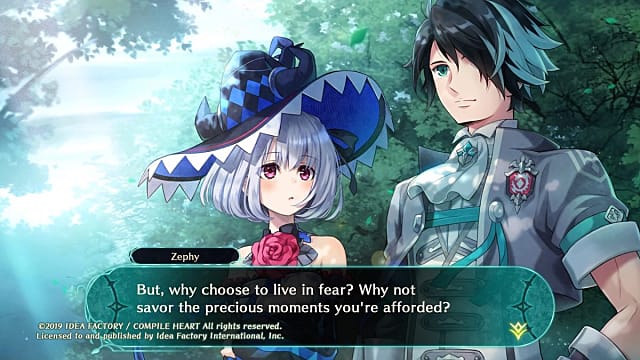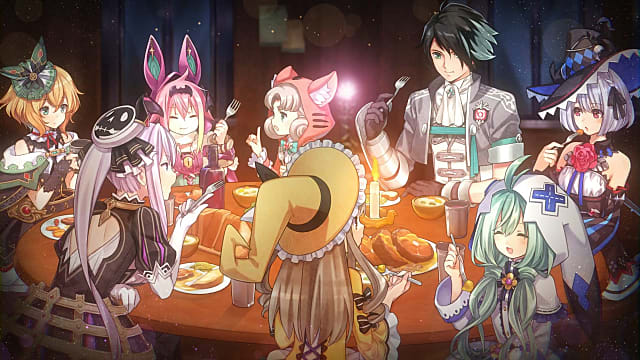

Idea Factory and Compile Heart's latest game to come West is Dragon Star Varnir. IF's titles aren't usually associated with much substance and tend to fit snugly into the niche category, but Varnir is a bit different.
It has its faults, for sure, including some less than spectacular writing and characterization that could do with some boosts. However, it boasts a compelling story set in a genuinely unique world, and it's not afraid to be dark and brutal in its narrative.
The combat system is dynamic as well and offers a substantial degree of freedom in how you customize your characters and approach combat.
It might not be for everyone, but Dragon Star Varnir is a solid RPG all around.
You're a Witch, Zephy
Dragon Star Varnir's story is an interesting one. Even though a fair bit of it ends up being predictable, the premise and build-up are compelling and unique enough to make up for the story beats you can see a mile off.
The game takes place in Varneria, a land that worships the divine savior Varnir. One group that defends the righteous on behalf of the emperor is the Knights of Requiem; they are dedicated to hunting and exterminating the witches who live in hiding throughout the land. As you'd expect, they believe there is no gray area here: witch = bad. Always.
They hunt dragons, too, but the player quickly finds out those are one and the same.
Without getting too spoilery for the story you can see coming a mile away, Zephy, the game's protagonist is a Knight of Requiem — for about 30 minutes, at least. Of course, all of this gets challenged when he's saved from near death and is imbued with power.
Of course, Zephy deals with both a sense of abandonment because the Knights want to kill him now and astonishment of his new identity. His less assertive friend wants to subvert the Knights and help, the witches don't trust him, and *gasp* it's possible the nation's religion is corrupt.
Much of this is not only easy to see coming, but it's been done elsewhere in other forms. The game doesn't necessarily try to do anything new or innovative with these tropes either, and the writing can be fairly shallow at times.
However, the larger setting and plot these are wrapped in does go a long way in keeping things interesting. On whole, it's a pretty dark story, with lots of death and tragedy — not something you typically associate with Idea Factory.
Magical Personalities?
What you do typically associate with Compile Heart and Idea Factory is lots of innuendo, women with impossibly large, gravity-defying breasts, and a distinct lack of characterization.
Some of that is present here. Despite the fact that witches are generally depicted as sexy in culture to begin with, the majority of female characters, including non-witches, aren't designed with what you could call sensitive representation in mind.
For what it's worth, the designs aren't quite as provocative as Xenoblade Chronicles 2, and also like XC2, the game doesn't really do anything with the designs other than putting them out there; this isn't a Neptunia game with groping, sex jokes, and the like.
The characters themselves could do with some more personality, though it isn't dreadful by any means. For the most part, the writing is distinct enough to give an idea of the personality behind the words, but it does stray into generic territory before the story really gets going.
Here, too, the setting redeems what's missing in characterization. For example, Zephy might be the typical protagonist, but he's stuck in a difficult and dark situation, which casts his willingness to help and desire for approval in a less cliche light. The same goes for many of the witches, especially Minessa.
Despite featuring in the opening movie, Minessa doesn't have a very strong personality at first. Once you learn about her past and connection to the Witch of Hellfire, though, it's easier to see her as a more interesting character.
Then there's Laponette, whom you meet shortly after finishing the opening sequences. She seems like the younger and more innocent "little sister" character — only, she has the ability to see the fortunes of those she comes in contact with. In other words, she knows how and when her friends will die.
You'll encounter plenty of additional characters on the way who follow this same pattern of semi-tropiness, and it's nice to see how effectively the setting and plot are used to give more substance to the whole affair.
One other thing worth noting is the harem aspect. With such a setup, you might expect the game to drip with harem anime tropes. Since you can romance some of the older witches, it exists to an extent. But Dragons Star Varnir navigates these waters well, keeping things from becoming too cringey; luckily, it's not a major focus.
Take to the Air
Where it falters with writing and characterization, Dragon Star Varnir really shines in its combat and character customization.
The basic setup is your typical turn-based system where each character has a type of physical attack — slash, hit, pierce — and elemental strengths and weaknesses, including fire, ice, water, earth, and light, among others.
In a bit of a twist, though, battles take place in midair, and the grid-based field is divided into three layers. Certain attacks can only be performed on a specific layer, some affect multiple squares, and some pierce all three layers. Not only do you need to plan your strategy around enemy placement, but you can also use the layers to push enemies into making certain moves.
It seems simple on the surface, but it rewards you for paying attention, for using space and movement alongside exploiting weaknesses.
For instance, say you know one character is weak to earth, and you don't want an enemy to spam two earth attacks in a row. You can split your party up so two are on one layer and one is further down (or above). At most, it's likely said boss will only use that attack once and spend the other attacking other layers with a spread-based attack.
Each character has a special set of Dragon Skills, with one, in particular, being most useful: Devour. It is what it says, and it lets you consume an enemy, should certain conditions be met, like the fear meter being raised through attacking their weaknesses. Devour grants the devour-er a special core with unlockable nodes that grant stat boosts or new skills. Boss dragons leave a core that every character can use, though.
That ends up being a lot of skills, though each category — physical, Dragon, etc — has a cap on how many skills you can take into battle with you. It's worth tinkering around with to find the best build for each character, and it can easily change over time.
Whether you want to make, say, Minessa a magic-focused character with spells ranging the gamut of elements or split her abilities between physical and magic is entirely up to you. Some characters are better suited for certain roles, like Laponette and, surprisingly, Karikaro (she wields a nasty looking spear but is stronger with magic). However, it's still a good idea to make sure a character can exploit at least two weaknesses, either physical or magical.
There are special Dragon Skills you can invest in as well that can only be used during Awakenings. These are a lot like Limit Breaks, really. Each party member has an Awakening meter that fills over the course of battle, and once it's full, they transform into a semi-dragon form, complete with stat boosts and the aforementioned superpowered Dragon Skills.
The downside to overusing these Dragon Skills is that they do a number on the character's balance and can hasten the dragon's birth inside that character.
All of these mechanics are explained via simple tutorial screens that give just enough information without outstaying their welcome; it can seem a bit overwhelming to have 10 tutorial pages to go through in a short time, but the way you implement what you just learned helps everything stick.
There's a lot going on, and it helps keep things interesting — which is good, because there is a risk of getting stale with the dungeon designs.
A Special Brew
Dragon Star Varnir is a peculiar mix of dungeon exploration, item crafting, combat, and visual novel. The vast majority of the game is told through still character portraits, with random segments showing 3D models and movement. The conversations tend to go on for a while. There's usually some interesting world-building involved or at least important exposition, though the writing often drags it down some.
Most of the navigation is done via menus, even in the den, and you pretty much only move around in 3D in the dungeons. Unfortunately, the dungeons tend to be a bit on the bland side.
You'll find lots of collection points, granting items you use to create elixirs and other important things, even more enemies, and very few puzzles. Those that do exist make use of party members' field skills, but they don't really require much thought; press the square button, and move on. It's all reminiscent of the PS2 era.
The visuals are as well, except the well-rendered portrait art. Models and enemies lack detail, movements on the field and in combat are very stiff, and overall, it doesn't take advantage of the PS4's capabilities.
How much of an issue that is depends on perspective. This is from a small developer and publisher, and a lot of RPGs don't prioritize cutting edge visuals. Those who aren't looking for the best graphics and smoothest animations likely won't find this too big of a problem.
The game's soundtrack is mostly good and makes good use of orchestral arrangements that fit a given area; the den is a particular favorite, partly because it's one of the few chipper areas and tunes in the game. Boss battles are a bit of a nuisance, though, since each repeats a rather grating chorale piece that overshadows any background instruments and consistently encouraged this writer to turn the volume down.
The game does sport an English voice track, which is a nice addition. It's a bit hit and miss at times, but the main gripe is just that a good chunk of the voiced exposition is delivered in a flat tone, even when it's meant to be emotional.
The Verdict
Pros
- Unique story and setting helps rise above predictable tropes
- Interesting characters and backstories
- Deep combat and character customization
Cons
- Some bland writing hampers characterization
- Dated visuals and a few audio quirks might turn some away
- Dungeon designs need some work
Dragon Star Varnir actually has a lot more going for it than the slightly stilted opening scenes and skimpy witch outfits might initially suggest. The setting and overarching plot are reason enough to see the journey through to the end, and the combat and customization make it easy to overlook some of the other problems you might encounter on the way.
It's not likely to convert newcomers to the genre or developer, but it's a worthy addition to the PS4's RPG library and tells a story you likely won't forget in a while.
[Note: A copy of Dragon Star Varnir was provided by Idea Factory for the purpose of this review.]




0 comments:
Post a Comment